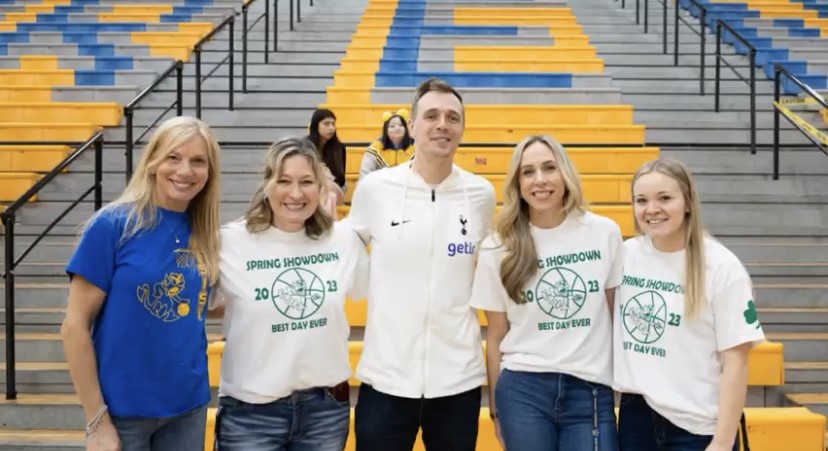The sit-com “Ted Lasso” follows an American football coach who was hired as a British soccer coach. He doesn’t know much about soccer, but despite that is relentlessly optimistic and determined. Student Services of Warren’s Almond Campus has their very own Ted Lasso: Mr. Jordan! From janitor to school psychologist, Mr. Jordan has seen schools through a variety of perspectives. Whether it be with cleaning supplies or data charts for intervention meetings, he has nearly done it all when it comes to school and individual student improvement. Mr. Jordan has worked at the high school for 10 years. In his early years he worked as a janitor in college, a school psychologist intern, and a one-on-one special education aide in graduate school.
School psychologists are often unrecognized for their work because they tend to live the “behind the scenes” world of schools. A school psychologist’s main focus is to help young people succeed academically, socially, behaviorally, and emotionally. To do this, school psychologists work alongside teachers, school administrators, and other professionals. The seemingly never ending list of responsibilities of a school psychologist can be perceived as intimidating or stressful, but Mr. Jordan finds the dynamic role more exciting than anything. “Everyday can be a little different–I really do live by my calendar. When I am asked to do something I am very much a ‘yes-man’.”
The day I interviewed Mr. Jordan, he faced this exact situation. “This morning, we had a meeting where a parent could only come in at 7 in the morning. It was a bit tricky for me because I had to take my daughter to daycare, and it did kind of disrupt the flow of a normal work day, but that was the only time we could meet. So, I found a way to make it work. I think I’m always willing to make that sacrifice if it makes a difference.”
Mr. Jordan’s experience and skills have transformed him into the great school psychologist he is today. When I asked Ms. Thompson, one of the Almond Campus’ case managers, to describe Mr. Jordan, she said, “He is very student-centered and cares greatly about ou r school’s community. Also, think of Ted Lasso…”
r school’s community. Also, think of Ted Lasso…”
Ms. Tragarz, one of the Almond Campus’ social workers, also commented on Mr. Jordan’s inner Ted Lasso with a story: “He often pulls motivational quotes or story lines from [Ted Lasso] to inspire us student services team members. Fun fact, last Halloween, the Student Services Department dressed up as characters from Ted Lasso.”
His behavior, personality, and work ethic truly reflect his passion for the school community. When he is asked about any future projects for the school he laughed, then replied, “How much time do you got for that?” He focuses greatly on school-wide improvements and has made it one of his priorities. Many of his coworkers, such as Ms. Tragarz, recognize this huge passion of his.
“He has strong leadership skills and is future focused when it comes to developing school-wide and student-centered improvement.” He improves the school as a whole by referring to tier one of MTSS (Multi-tiered Systems of Support), a framework schools follow to develop their student support. Mr. Jordan describes tier one of MTSS as school-wide support systems. Examples of this support system at WTHS include the famous Warren Way behavior matrix he created. Specifically, he concentrates on the engagement aspect of the Warren Way. Mr. Jordan explains how fun activities and assemblies keep students engaged, ultimately allowing “students to feel good and more connected with the sense of belonging they create.”
Another great example of tier one activities include the ELS basketball game that was held last year during the school day. Mr. Jordan enjoyed how “everyone was pumped and excited. Those kinds of school days are the ones I really look forward to because of the energy it gives.” He truly believes that a good school culture and climate is the foundation for a healthy school, and his contributions to the WTHS community really highlight that passion.
Mr. Jordan has contributed to many projects for the school but is most proud of his push on this educational survey known as “Panorama”. The survey is used by schools to collect and analyze data about social-emotional learning (SEL), behavior, performance, etc. Mr. Jordan adds that it took a couple years to convince our district on why “Panorama” is important and valuable, but it was a big success and accomplishment for the district. Mr. Jordan explained how WTHS utilizes “Panorama”.
“Now, we look at those students who are maybe not meeting expectations or are struggling, and organize intervention plans for them. This year is the first year that school psychologists are in charge of those meetings and ‘Panorama’ has been a huge help in that process.”
Mr. Jordan, and school psychologists as a whole, plays a significant role in the shaping and development of schools and individual students. It is important to recognize them for all their hard work. During our interview, Mr. Jordan recalled a particular student that he went above and beyond with to try to get the student connected. The student moved from a private school to WTHS, and the move really made him struggle. Mr. Jordan said that “[he] really pushed and pushed with this kid to try to get to know him. That case was one of the only times I went to a student’s house as a home visit. I talked to the parents and we sat out back on the porch and everything.” The student ended up dropping out, but a couple years ago the student did follow up and called Mr. Jordan. “He told me he had gotten his GED, that I had a big impact on his life…just the fact that he called back made me feel good. Watching students’ successes always makes me feel really good.”
Mr. Jordan’s genuine passion for helping young people is what makes him a fantastic school psychologist. A quote from “Ted Lasso” undeniably reflects Mr. Jordan’s values and his mindset: “For me success is not about the wins and losses. It’s about helping these young fellas be the best versions of themselves on and off the field. And it’s ain’t always easy, but neither is growing up without someone believing in you.”




